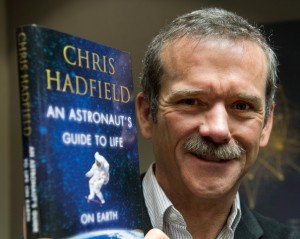Mini review of ‘An Astronaut’s Guide to Life on Earth’
 I finished this audio book today and enjoyed it a lot, maybe in part due to the fact that I listened to it while hiking in the northern Lake District. Chris Hadfield reads the book himself and as it’s a deeply personal book this works well, even though Chris isn’t on a par with the best audio book performers, he’s plenty good enough. The fact that Chris reads the book is actually perfectly attuned with two of the themes of the book, keep learning to do new things, and work hard.
I finished this audio book today and enjoyed it a lot, maybe in part due to the fact that I listened to it while hiking in the northern Lake District. Chris Hadfield reads the book himself and as it’s a deeply personal book this works well, even though Chris isn’t on a par with the best audio book performers, he’s plenty good enough. The fact that Chris reads the book is actually perfectly attuned with two of the themes of the book, keep learning to do new things, and work hard.
The book loosely tells tells the story of Chris’s career, although it’s punctuated with many interesting perspectives on how to live well. I will try and sum up the general life messages, followed by some very interesting observations about NASA:
- Work hard, although Chris was very passionate about going into space from a young age, he puts a big emphasis on the need to work hard at whatever work you are doing, regardless of whether you see a direct connection to your passion. The route to achieving your passion can be filled with many missed turns and may be hard to map out in advance. This is consistent with another excellent book I’ve recently read on the topic of career/life advice So Good They Can’t Ignore You: Why Skills Trump Passion in the Quest for Work You Love
- Enjoy the work you do, much of the work of a trainee and a fully fledged astronaut is mind numbingly boring routine, you need to cultivate an attitude that allows you to enjoy working hard and doing as good a job as you are able, regardless of what the job actually requires you to do. Although he doesn’t mention it this is Mindfulness and I’m a big fan.
- Keep learning, preparing for anything related to space flight takes many months if not years of learning and practising, you need to learn to love learning
- Learn from mistakes, someone who has never made mistakes is less valuable than someone who has made many. Making mistakes prepares you mentally to keep learning when the going gets tough and not give up and allows you to bounce back. In difficult circumstances the person who’s made mistakes will be more resilient and have a better tool kit of problem solving skills
- Practice, practice again, and again, don’t expect expertise to come easily, anything worthwhile needs a lot of practice, months if not years of disciplined rigorous practice
- Don’t think to much of yourself, it’s better to help others than to expect others to help you. That provides a better frame of mind.
- Competence before confidence, work hard to achieve competence, competence is hard won but once you have it you will have confidence to cope with what life throws at you. Confidence before competence is a fools game.
Chris also provided a few fascinating insights into NASA and the CSA
- They invest very heavily in community and family, generating a truly inspiring supportive culture and a very friendly place to work. By the sound of it, it must be pretty hard in NASA if you don’t make friends easily, drink, sing and play guitar
- They expect returning astronauts to get stuck into serving the next mission, they go from being the stars to being one of the team within a week or so
- They take many measures to keep astronauts humble, for example they expect them to act as companions and ‘servants’ to the families of astronauts on mission
- A huge amount of the science that goes on on the ISS is dedicated to studying the effects of space on humans, the astronauts themselves are the subjects of these experiments and they are endless and must require a lot of good ‘attitude’ to put up with
- Community outreach is hugely important
Chris had/has a very popular twitter account his son coached him in social media and encouraged him to create the incredible first music video from space
The book is much more interesting than this review would suggest!

1 Response
[…] My reflections on his book are here Mini review of ‘An Astronaut’s Guide to Life on Earth’ […]